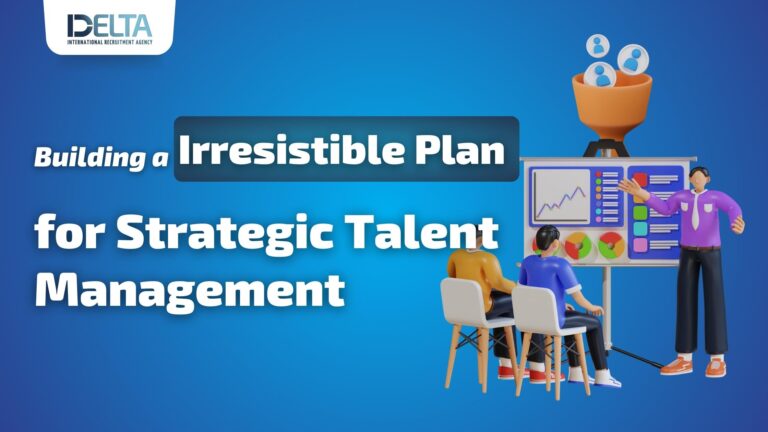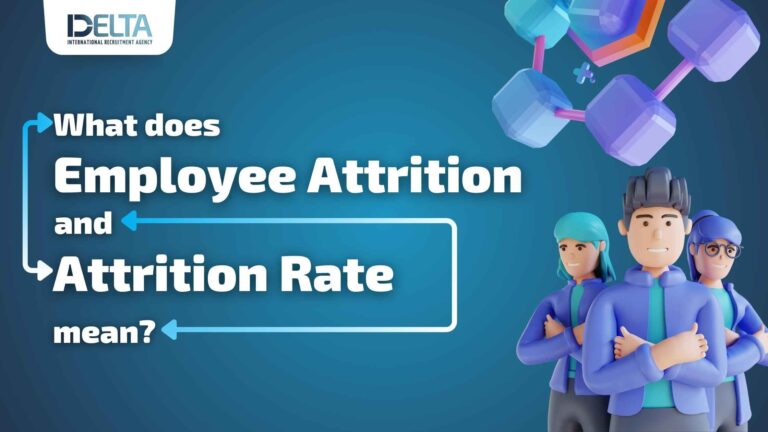How do you build an irresistible strategy for talent management by a recruitment agency for Qatar? It sounds like a daunting task, but with the right approach and execution, it is actually quite simple. In this guide, we will outline a step-by-step plan that will help you develop an unbeatable strategy for retaining talented employees.
One of the most important aspects of any business is its ability to attract and keep top talent. If your organization can’t find or keep good employees, it will struggle to compete in the market. However, attracting and retaining top talent is not as simple as it seems. There are a number of factors that need to be in place in order to achieve success.
In this guide, we will outline a systematic plan that will help you build an unbeatable strategy for talent management. By following these guidelines, you will be able to develop a winning plan that will help you retain talented employees.
What Constitutes Talent Management Strategy?
Talent management is how HR (Human Resources) plans and organizes to get the best employees. The goal is to make the company better and stand out in the business world. Talent management strategy is the plan to make sure your employees do their best. Here is what it includes:
- Speeding up Work for Better Results: Make people work faster for the best productivity.
- Finding what’s Missing: Figure out what skills and tools are needed for the job.
- Teaching New Skills: Train people who need to learn new things.
- Keeping Employees Happy: Make sure your employees are engaged and want to stay.
Talent Management Process
What Does the Talent Management Process Involve?
The talent management process starts by recognizing the need for talented individuals. This process helps fill gaps, enhance, and develop the skills, qualities, and expertise of both new and existing employees. Once you understand what is needed, you follow a detailed plan that includes the following steps:
-
Plan:
- Identify where the gaps are, especially in terms of the people you need.
- Create job descriptions to guide your recruitment efforts.
- Develop a workforce for hiring new employees.
-
Attract:
- Use effective strategies to attract a good number of applicants.
- Utilize job portals, referrals, and social networks for a wide search.
- Your employer branding plays a role in determining the quality of applicants.
-
Select:
- Conduct written tests, interviews, group discussions, and in-depth analysis of applicants.
- Use AI-driven tools to efficiently go through CVs and find suitable candidates.
-
Develop:
- Follow the principle of “hiring for attitude and training for skills.”
- Build a strong onboarding program for new hires.
- Train, coach, or mentor employees to develop their skills.
-
Retain:
- Ensure employee retention by offering promotions, salary increases, growth opportunities, rewards, and involvement in important projects.
-
Transition:
- Complete the talent management process by transitioning each employee through their growth.
- Provide retirement benefits and conduct exit interviews to make employees feel valued and connected to the organization.
Creating a Talent Management Strategy: Steps to Follow
Commencing with the recruitment of the right individuals, talent management goes beyond to establish strategic objectives for retaining and maximizing their productivity. It’s more than just a list to follow—it demands effective implementation, regular checks, and continuous enhancements.
The subsequent points outline the essential strategies for effective talent management in a well-functioning organization:
1. Detailed Job Descriptions:
- Comprehensive job descriptions are essential for clarity. They benefit the hiring manager, sourcing software, and candidates by providing a detailed understanding of the job role.
- Elements to include:
- Job title and location
- Required skills
- Overall duties and requirements
- Knowledge of tools and equipment
- Salary and additional benefits
- This information empowers job seekers to make informed decisions about whether the role aligns with their skills and aspirations.
2. Proper Onboarding Process:
- The onboarding process sets the tone for employees’ experience with the company and plays a crucial role in shaping their perception of the organizational culture.
- Create a positive first impression by designing workshops, shadowing days, or mentorship programs.
- A smooth onboarding process helps employees integrate seamlessly into the organization’s culture.
3. Training and Development:
- Tailor a structured training program based on individual employee goals and development needs.
- Training not only enhances competence but also contributes significantly to better business results.
- Recognize the potential for growth in each employee and provide targeted development opportunities.
4. Organizational Goals:
- Clearly define the company’s objectives to provide a roadmap for evaluating the existing workforce and assessing new roles.
- Understanding organizational goals is crucial for employees to align their efforts and contribute to the overall success of the company.
5. Work Culture:
- The importance of a proper fit between employees and the work culture cannot be overstated.
- Strengthen the work culture through regular team-building activities, fostering collaboration and a sense of belonging among team members.
6. Employee Feedback:
- Regularly provide positive feedback to employees to help them evolve their skills and expertise.
- This not only boosts morale but also prepares employees for future challenges and changes within the organization.
7. Recognition and Rewards:
- Motivate and engage employees by recognizing and rewarding their contributions.
- Rewards extend beyond monetary benefits and can include opportunities to be involved in important projects, contributing to their sense of value within the organization.
8. Growth Opportunities:
- Equip employees with the tools they need to maximize their potential and continuously improve.
- Envision the organization’s future by offering growth opportunities, ensuring employees remain aligned with the company’s trajectory.
9. Succession Planning:
- Acknowledge that employees may retire or resign at any point in their careers.
- Develop a succession plan through mentoring and coaching to ensure a smooth transition and continuity in key roles
10. Exit Interviews:
-
Conduct thorough exit interviews to gain insights into the reasons for voluntary turnover.
-
Understand the challenges employees faced during their tenure and use this information to identify and address potential improvements in the talent management process.
In Summary
Having a smart talent plan is like having a guide that helps your company keep its employees happy because they know what goals to aim for. In addition, technology makes it easier to understand how things work.
An agency like Delta International Recruitment Agency comes with tools such as managing candidates and analyzing data. These features make it easy for you to use and succeed with your talent plan. This means you can find the right people for your team, keep them happy, and make your company even better!
Updates: Building a Irresistible Plan for Strategic Talent Management




